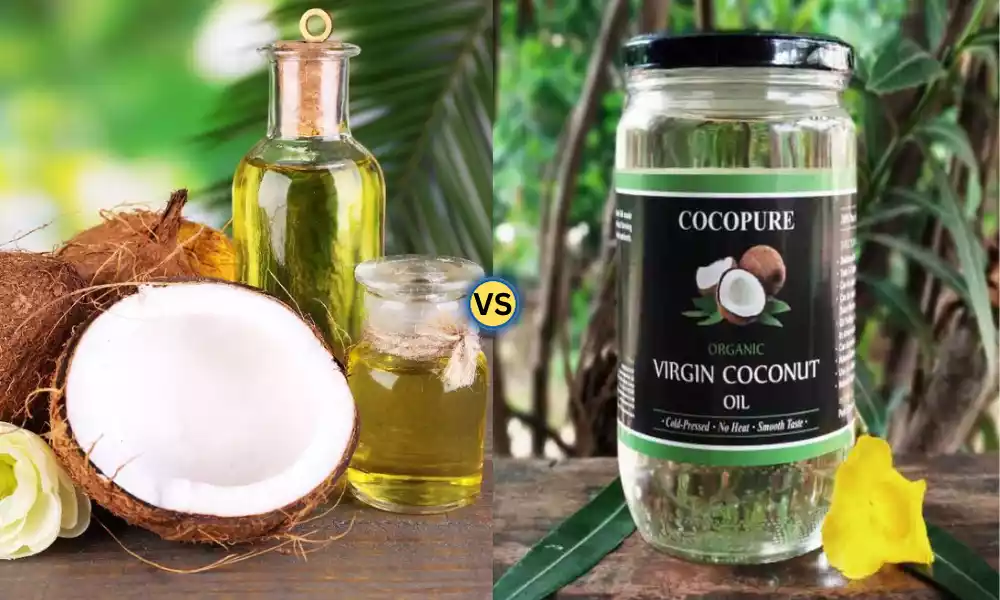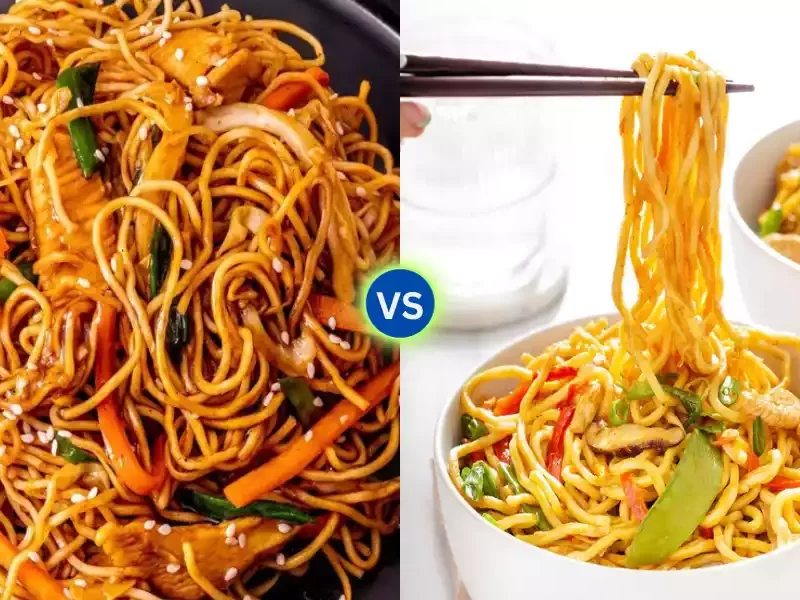Coconut Oil and Virgin Coconut Oil are both popular natural products derived from coconuts. Coconut oil is obtained through various extraction and refining processes, resulting in a neutral-flavored oil used in cooking, skin care, and various applications. In contrast, virgin coconut oil is extracted from fresh coconut meat using minimal processing, preserving its strong coconut flavor and aroma.
Virgin coconut oil is often chosen for its potential health benefits and its suitability in culinary uses where a pronounced coconut taste is desired. Understanding the differences between these two coconut-derived oils is essential for making informed choices in cooking, health, and beauty applications.
What is Coconut Oil?
Coconut oil is a natural oil that is extracted from the meat or kernel of coconuts, which are the fruit of the coconut palm tree (Cocos nucifera). It is a versatile and widely used oil known for its various applications.
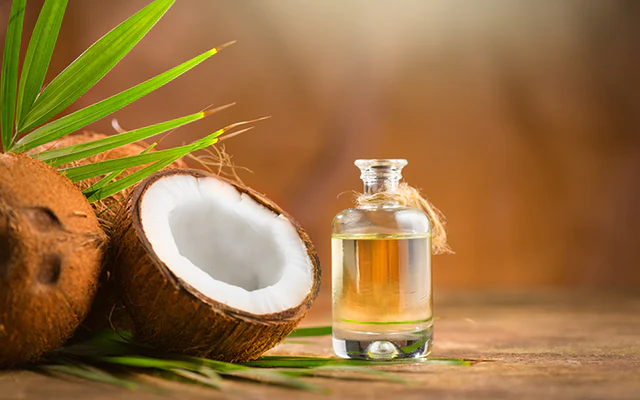
Here are some key characteristics and features of coconut oil:
- Extraction Process: Coconut oil is typically obtained through various extraction methods, with the most common being:
- Copra-Drying Process: This involves drying the coconut meat (known as copra) and then mechanically pressing it to extract the oil.
- Solvent Extraction: In this method, chemical solvents are used to separate the oil from copra.
- Refining Process: After extraction, coconut oil often undergoes refining processes, which may include bleaching and deodorizing. These processes help remove impurities and neutralize the oil’s flavor and aroma.
- Composition: Coconut oil is primarily composed of saturated fats, with a high percentage of medium-chain fatty acids (MCFAs). The most abundant fatty acid in coconut oil is lauric acid. It is solid at room temperature but becomes a liquid when exposed to heat.
- Flavor and Aroma: Refined coconut oil typically has a neutral flavor and aroma, which makes it suitable for a wide range of culinary applications.
- Culinary Uses: Coconut oil is commonly used in cooking, baking, and frying due to its high smoke point. It imparts a mild, slightly sweet flavor to dishes and is popular in tropical and Asian cuisines.
- Cosmetic and Skincare Uses: Coconut oil is used in a variety of cosmetic and skincare products due to its moisturizing properties. It is often found in creams, lotions, and hair care products.
- Potential Health Concerns: Coconut oil has been a subject of debate in the health and nutrition community because of its high saturated fat content. While some people believe it may have health benefits, others caution against its excessive consumption due to concerns about its impact on cholesterol levels.
Coconut oil is a widely used oil known for its versatility in cooking, skincare, and various applications. Its flavor and aroma, as well as its saturated fat content, make it unique among cooking oils, and it has gained popularity for both culinary and cosmetic purposes.
What is Virgin Coconut Oil?
Virgin coconut oil (VCO) is a type of edible oil extracted from the meat of fresh coconuts without the use of high heat or chemical processes. It is often referred to as “virgin” or “extra-virgin” coconut oil to emphasize its purity and minimal processing.
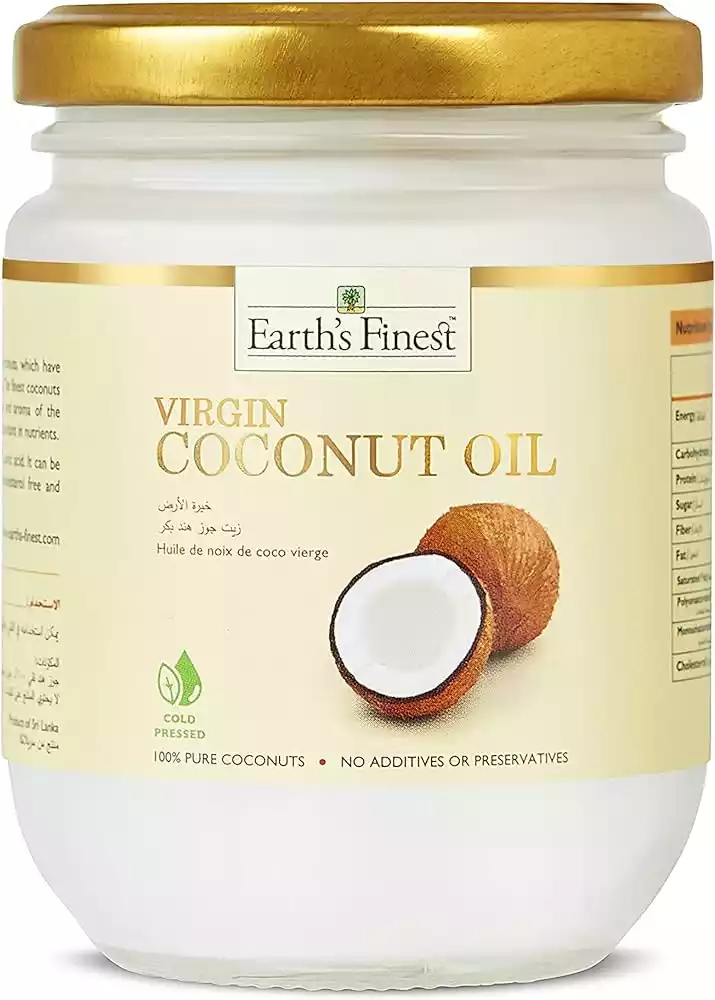
Here are some key characteristics and features of virgin coconut oil:
- Extraction Process: Virgin coconut oil is typically produced through one of two primary methods: a. Cold-Pressing: In this method, fresh coconut meat is mechanically pressed to extract the oil. The process involves minimal heat, which helps retain the natural flavor and aroma of the coconut. b. Fermentation: Some VCO is produced through natural fermentation, where enzymes and time are used to separate the oil from the coconut milk. This method also preserves the oil’s natural characteristics.
- Minimal Processing: Unlike refined coconut oil, which undergoes processes like bleaching and deodorizing, VCO is minimally processed. This minimal processing helps preserve the oil’s nutritional content, flavor, and aroma.
- Flavor and Aroma: Virgin coconut oil has a distinct and strong coconut flavor and aroma. This natural coconut essence makes it a preferred choice in culinary applications where a pronounced coconut taste is desired.
- Nutritional Benefits: Virgin coconut oil is often praised for its potential health benefits. It contains medium-chain fatty acids (MCFAs), with lauric acid being the most prominent. MCFAs are believed to have certain health advantages and may support heart health and metabolism.
- Cosmetic and Skincare Uses: Due to its natural moisturizing properties, VCO is commonly used in skincare and haircare products. It can be applied directly to the skin and hair for nourishment and hydration.
- Health Potential: Some studies suggest that the MCFAs in virgin coconut oil may have various health benefits, such as antimicrobial properties and potential benefits for brain health. Further research is needed to confirm these claims, and it’s essential to consume coconut oil in moderation due to its saturated fat content.
Virgin coconut oil is typically more expensive than regular coconut oil because of the labor-intensive and less industrialized methods used in its production. It is favored for its natural, unrefined characteristics and is commonly used in traditional cooking, baking, and various beauty and wellness applications.
Comparison Table of Coconut Oil and Virgin Coconut Oil
Below is a comparison table highlighting the key differences between regular Coconut Oil and Virgin Coconut Oil:
| Characteristic | Coconut Oil | Virgin Coconut Oil |
|---|---|---|
| Extraction Process | Various methods, including copra-drying and solvent extraction. | Cold-pressed or fermentation, minimal heat involved. |
| Processing | Often refined with bleaching and deodorizing. | Minimal processing, no refining, retains natural properties. |
| Flavor and Aroma | Neutral flavor and aroma. | Strong coconut flavor and aroma. |
| Nutritional Content | Saturated fats; minimal nutrients retained after refining. | Medium-chain fatty acids (MCFAs) and essential nutrients are preserved. |
| Health Considerations | Debate over impact on cholesterol levels due to saturated fats. | Potential health benefits due to MCFAs, although more research is needed. |
| Culinary Uses | Versatile for cooking, baking, and frying, mild flavor. | Used in traditional recipes where strong coconut taste is desired. |
| Cosmetic and Skincare Uses | Used in skincare and hair care products, moisturizing. | Common in beauty and skincare products for natural hydration. |
| Smoke Point | High smoke point, suitable for frying. | Lower smoke point, ideal for lower-heat cooking and flavoring. |
| Price and Availability | Generally affordable and widely available. | Tends to be more expensive due to specialized production. |
Both coconut oil and virgin coconut oil have their own unique characteristics and are suitable for different culinary and skincare purposes. The choice between the two depends on the specific flavor, aroma, and properties desired in a particular application. Additionally, individual dietary preferences and health considerations should also be taken into account when choosing between these oils.
Health Benefits of Coconut Oil and Virgin Coconut Oil
Both coconut oil and virgin coconut oil offer potential health benefits due to their unique compositions and properties, although the extent and significance of these benefits can vary.
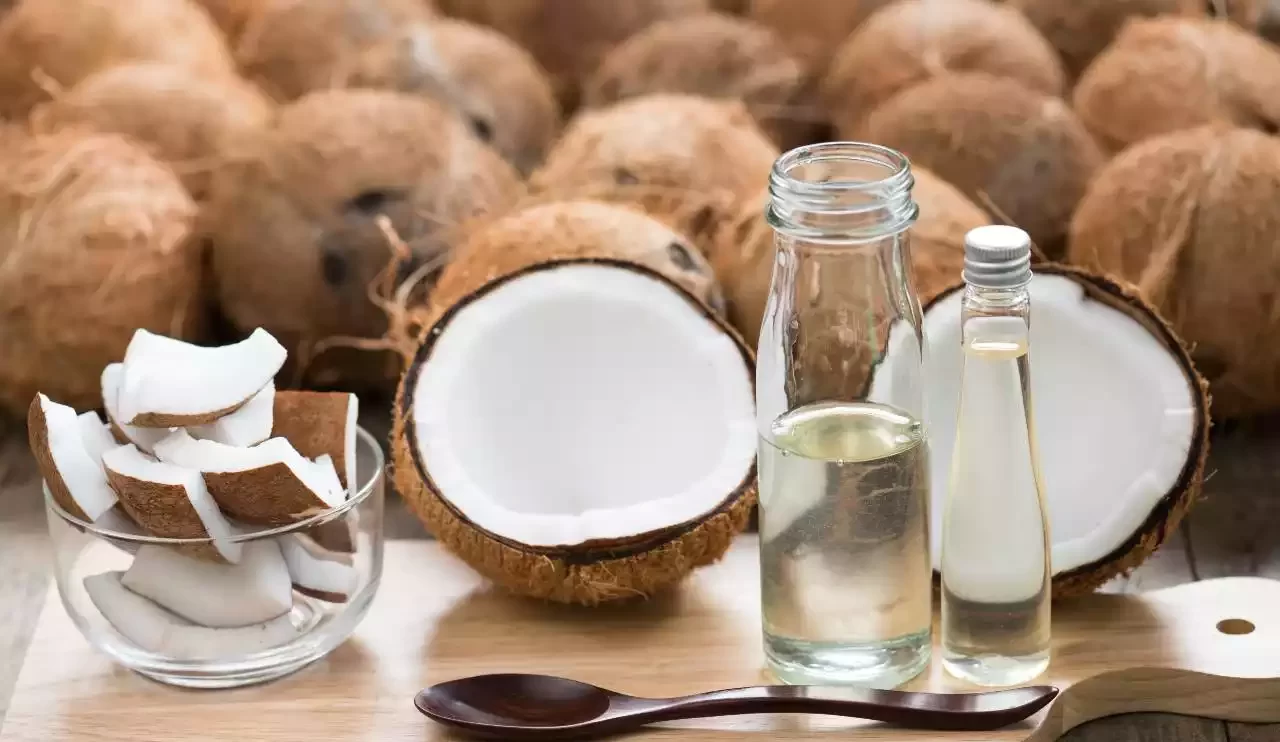
Here are some of the health benefits associated with both types of coconut oil:
1. Medium-Chain Fatty Acids (MCFAs): Both coconut oil and virgin coconut oil are rich in MCFAs, particularly lauric acid, which has various health benefits, including:
- Weight Management: MCFAs can promote satiety and boost calorie expenditure, potentially aiding in weight management.
- Heart Health: While coconut oil contains saturated fats, its MCFAs may have a neutral or even positive effect on heart health when consumed in moderation.
2. Antimicrobial Properties: The lauric acid in both types of coconut oil has potent antimicrobial properties, which can help combat harmful bacteria, viruses, and fungi, supporting overall immune function.
3. Skin and Hair Care: Both coconut oil and virgin coconut oil are used in skincare and haircare products due to their moisturizing and protective properties. They can help hydrate the skin, reduce inflammation, and improve hair health and shine.
4. Brain Health: The MCFAs in both types of coconut oil can provide an alternative source of energy for the brain, potentially benefiting cognitive function. This is being explored in the context of neurodegenerative conditions like Alzheimer’s disease.
5. Oral Health: Oil pulling with coconut oil, including virgin coconut oil, may contribute to improved oral hygiene by reducing harmful bacteria in the mouth and promoting healthier gums.
6. Anti-Inflammatory Effects: Coconut oil, including virgin coconut oil, contains antioxidants and polyphenols that may possess anti-inflammatory properties, potentially benefiting overall health.
7. Digestive Health: Both types of coconut oil may support digestive health by promoting a healthy balance of gut bacteria and reducing inflammation in the digestive tract.
8. Improved Hair and Skin Health: The moisturizing properties of both coconut oil and virgin coconut oil can help maintain healthy hair and skin, reducing dryness and irritation.
Both coconut oil and virgin coconut oil in moderation, as they are calorie-dense and contain saturated fats. The balance of MCFAs and saturated fats, as well as the specific composition of each oil, may vary slightly, leading to different flavors and aromas.
Ultimately, the choice between these oils depends on personal preferences and the desired flavor and aroma in culinary applications. As with any dietary change or supplement, it’s advisable to consult with a healthcare professional or registered dietitian for guidance, especially if you have specific health concerns or conditions.
Culinary Uses
Coconut oil and virgin coconut oil have various culinary uses and can be incorporated into a wide range of dishes and cooking methods. Here are some common culinary uses for both types of coconut oil:
1. Cooking and Frying:
- Coconut Oil: Regular coconut oil has a high smoke point (around 350°F or 177°C), making it suitable for frying, sautéing, and stir-frying. It imparts a mild coconut flavor to dishes.
- Virgin Coconut Oil: While VCO has a slightly lower smoke point compared to refined coconut oil, it can still be used for lower-heat cooking methods such as sautéing and baking. Its strong coconut flavor makes it ideal for recipes where a pronounced coconut taste is desired.
2. Baking:
- Coconut Oil: Both coconut oil and VCO can be used as a butter or oil substitute in baking recipes. They add moisture and a subtle coconut flavor to baked goods like muffins, cookies, and cakes.
3. Salad Dressings and Marinades:
- Virgin Coconut Oil: VCO can be used in salad dressings and marinades to infuse dishes with a tropical coconut aroma and flavor.
4. Popcorn Topping:
- Coconut Oil: Melted regular coconut oil is a popular choice for drizzling over popcorn, adding a unique flavor twist to this classic snack.
5. Smoothies and Beverages:
- Coconut Oil: Adding a small amount of coconut oil to smoothies can provide a creamy texture and a subtle coconut flavor. It’s particularly popular in tropical fruit smoothies.
6. Coffee and Tea Enhancer:
- Coconut Oil: Known as “bulletproof coffee” or “butter coffee,” some people blend coconut oil into their morning coffee or tea for added creaminess and potential energy-boosting effects.
7. Vegan and Dairy-Free Cooking:
- Coconut Oil: It’s commonly used in vegan and dairy-free recipes as a substitute for butter or other cooking fats.
8. Thai and Southeast Asian Cuisine:
- Both Coconut Oil and Virgin Coconut Oil: Both oils are integral ingredients in Thai and other Southeast Asian cuisines, where they are used in curries, soups, and desserts, imparting authentic flavors.
9. Stir-Fried and Asian Dishes:
- Coconut Oil: Refined coconut oil is suitable for stir-frying and cooking various Asian dishes.
10. Baking and Desserts: – Virgin Coconut Oil: Due to its pronounced coconut flavor, VCO is often used in tropical desserts, coconut-based cakes, and sweets.
11. Seasoning Cast Iron Cookware: – Coconut Oil: Coconut oil can be used to season cast iron cookware, creating a non-stick surface and adding a layer of protection against rust.
The choice between regular coconut oil and virgin coconut oil depends on the desired flavor and aroma in your dishes. Virgin coconut oil, with its strong coconut taste and aroma, is preferred when you want to highlight coconut flavor, while refined coconut oil provides a neutral taste. Use both types of coconut oil in moderation, as they are calorie-dense due to their fat content.
Cosmetic and Skincare Uses
Both coconut oil and virgin coconut oil have a wide range of cosmetic and skincare uses due to their moisturizing and nourishing properties. Here are some common cosmetic and skincare applications for both oils:
1. Moisturizer: Both coconut oil and virgin coconut oil can be applied directly to the skin as natural moisturizers. They help hydrate and soften dry skin, leaving it feeling smooth and supple.
2. Makeup Remover: Coconut oil, in particular, is an effective and gentle makeup remover. It can dissolve makeup, including waterproof products, while also moisturizing the skin.
3. Lip Balm: Apply a small amount of coconut oil or virgin coconut oil to dry or chapped lips to provide instant hydration and relief.
4. Body Lotion: After a shower or bath, use either oil as a body lotion to lock in moisture and keep your skin feeling hydrated throughout the day.
5. Massage Oil: Both oils make excellent massage oils due to their natural slip and glide. They also have a pleasant, subtle fragrance.
6. Hair Conditioner: Coconut oil and virgin coconut oil can be used as hair conditioners to soften and nourish dry or damaged hair. Apply a small amount to your hair, leave it on for a while (even overnight), and then wash it out.
7. Split Ends Treatment: Apply a tiny amount of coconut oil or virgin coconut oil to the ends of your hair to help reduce split ends and frizz.
8. Scalp Treatment: Massaging coconut oil or virgin coconut oil into your scalp can help moisturize and soothe a dry or flaky scalp. It may also promote hair growth and improve overall hair health.
9. Cuticle Oil: Use a small amount of either oil to moisturize and soften your cuticles, keeping your nails and nail beds healthy.
10. Body Scrub: Mix coconut oil or virgin coconut oil with sugar or salt to create a natural exfoliating scrub. Gently massage it onto your skin to remove dead skin cells and reveal smoother skin.
11. Sunburn Relief: The soothing and moisturizing properties of these oils can help provide relief from sunburn. Apply a thin layer to affected areas for comfort.
12. Stretch Mark Prevention: During pregnancy or periods of weight gain, applying coconut oil or virgin coconut oil to the skin may help prevent or minimize the appearance of stretch marks.
13. Eczema and Psoriasis Relief: Some individuals with eczema or psoriasis find relief from itching and inflammation by applying coconut oil or virgin coconut oil to affected areas.
14. Shaving Cream Substitute: For a natural and moisturizing alternative to shaving cream, use coconut oil or virgin coconut oil for a smooth shave.
While many people find these oils beneficial for their skincare and cosmetic needs, individual skin types and sensitivities vary. Conduct a patch test before using them extensively on your skin, especially if you have sensitive or allergy-prone skin. Additionally, be mindful of the potential greasiness of the oils, as they may not be suitable for all skin or hair types.
Safety Precautions
Coconut oil and virgin coconut oil are generally safe for most people when used in moderation and for their intended purposes. It’s important to keep some safety precautions in mind:
1. Allergies: While coconut allergies are relatively rare, they can occur. If you or someone you’re serving has a known coconut allergy, it’s crucial to avoid using any coconut-based products, including coconut oil, as they can trigger allergic reactions.
2. Skin Patch Test: Before using coconut oil or virgin coconut oil on your skin or hair, especially if you have sensitive skin or a history of allergies, conduct a patch test. Apply a small amount to a small area of skin and wait 24-48 hours to check for any adverse reactions, such as redness, itching, or irritation.
3. Avoid Ingesting Excessive Amounts: While coconut oil is generally safe for consumption, it is calorie-dense due to its fat content. Excessive consumption can lead to weight gain and digestive discomfort. Use it in moderation as part of a balanced diet.
4. Avoid Overheating: When using coconut oil for cooking, be cautious not to overheat it to the point where it smokes. Overheating can break down the oil and create harmful compounds. Stay within the recommended smoke point range for the specific type of coconut oil you are using.
5. Store Properly: Store coconut oil and virgin coconut oil in a cool, dry place away from direct sunlight. Exposure to heat and light can cause the oil to become rancid. If your coconut oil develops an off-putting odor or flavor, it may have gone bad and should be discarded.
6. Choose Quality Products: Opt for reputable brands known for their quality and purity when purchasing coconut oil or virgin coconut oil. Look for labels like “organic” or “extra virgin” to ensure you are getting a high-quality product.
7. Children and Pets: Be cautious when using coconut oil around young children and pets. While it is generally safe, ingestion of large amounts may lead to digestive discomfort. Keep containers out of their reach to prevent accidental consumption.
8. Consult a Healthcare Professional: If you are using coconut oil or virgin coconut oil for specific health purposes or as a remedy for a medical condition, it’s advisable to consult with a healthcare professional or registered dietitian. They can provide guidance and ensure it is safe and appropriate for your individual needs.
9. Be Mindful of Skin and Hair Sensitivities: Coconut oil, especially virgin coconut oil, may not be suitable for everyone’s skin or hair. If you experience any irritation or adverse reactions when using it topically, discontinue use and consult a dermatologist if necessary.
10. Quality Control: If you make homemade coconut oil or purchase it from an unverified source, be cautious about its purity and quality. Ensure that it has been properly processed and is free from contaminants.
Incorporating coconut oil and virgin coconut oil into your culinary and skincare routines can be safe and beneficial when used responsibly and in accordance with these safety precautions. Individual responses to these products may vary, so always be attentive to your body’s reactions and adjust your usage accordingly.
Conclusion
Coconut Oil and Virgin Coconut Oil are versatile and natural products derived from coconuts, offering various culinary, cosmetic, and potential health benefits. Coconut oil, with its neutral flavor and aroma, is suitable for a wide range of cooking applications and skincare uses. On the other hand, virgin coconut oil, with its strong coconut taste and aroma, is favored for culinary dishes where a pronounced coconut flavor is desired, as well as for natural skincare and hair care.
Both oils contain medium-chain fatty acids (MCFAs) that have generated interest for their potential health benefits, but it’s important to use them in moderation and consider individual dietary and skin sensitivities. Ultimately, the choice between the two depends on personal preferences and specific culinary or cosmetic needs.

